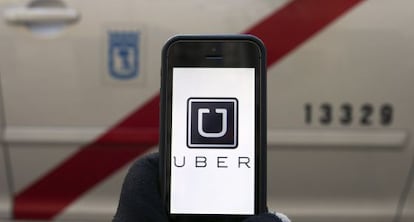Uber reaches out to Spanish regulators in a major strategy shift
Car-sharing service willing to provide income information on drivers to local tax authorities

Uber, the US car-sharing service, is trying to patch up its relationship with Spanish administrations, in the midst of its continuing legal battle with Madrid before the European Court of Justice.
In a document obtained by EL PAÍS, Uber officials have recognized the “mistakes” they made when they began operating in Spain in late 2014.
We have certainly made mistakes in Spain” Uber internal document
They say they are now willing to cooperate with Spanish tax authorities in sharing information about their self-employed drivers’ wages in exchange for “flexibility” for the issuing of passenger transport vehicle licenses (VTC) to the company.
On December 31, a Madrid judge accepted a lawsuit by local taxi drivers and ordered the US-based company to cease all its nationwide operations while the case is settled in court. In March of this year, Uber complained to Brussels, and the EU Court of Justice must now determine whether the ban violated European laws.
In the meantime, the smartphone application service began offering take-away food deliveries instead of transporting passengers.
Regardless of the European ruling, Uber wants “to take a step back to later be able to take a few steps forward,” said Carles Lloret, the company’s general manager in Spain, during an interview with EL PAÍS.
In the medium-term, Uber wants to focus its efforts on Uber X – a car-sharing service in which drivers have almost full-time dedication to their job, and which is now offered in 24 of 28 EU countries – in detriment of the Uber Pop taxi service, where a private individual offers a personalized service to another.
Uber wants to focus its efforts primarily in Madrid, putting Barcelona on the back burner "for the moment."
“We are convinced that a regulatory change will take place sooner or later allowing us to operate Uber Pop, but for the moment we are concentrating on a service with professional drivers,” Lloret said.
Currently, Spain allows a single VTC license for every 30 taxi licenses it issues, and requires each of these operators to have a minimum fleet of seven cars. “We do not see the logic behind this and that is why we are asking for a more flexible framework,” he said.
Despite the request, Uber’s pitch has changed. “We have certainly made mistakes in Spain,” the document states. “However, from now on we are committed to working closely with regulators to expand transportation options for citizens and foster new business opportunities.”
We cannot pay taxes for our drivers, but we can give all the information to the treasury”
Uber has also agreed to open its books so that tax officials can look at the money each driver is making through the service.
“We cannot pay taxes for our drivers, but we can give all the information to the treasury.”
This way, the AEAT tax collection agency would be able to corroborate the income statements filed by Uber drivers and other self-employed workers at the company.
“We have been attacked on three fronts: they said that we do not operate under license, that our service is not safe, and that we encourage the underground economy. We want to change that perception with facts,” said a spokesperson for the San Francisco-based company.
English version by Martin Delfín.
Tu suscripción se está usando en otro dispositivo
¿Quieres añadir otro usuario a tu suscripción?
Si continúas leyendo en este dispositivo, no se podrá leer en el otro.
FlechaTu suscripción se está usando en otro dispositivo y solo puedes acceder a EL PAÍS desde un dispositivo a la vez.
Si quieres compartir tu cuenta, cambia tu suscripción a la modalidad Premium, así podrás añadir otro usuario. Cada uno accederá con su propia cuenta de email, lo que os permitirá personalizar vuestra experiencia en EL PAÍS.
¿Tienes una suscripción de empresa? Accede aquí para contratar más cuentas.
En el caso de no saber quién está usando tu cuenta, te recomendamos cambiar tu contraseña aquí.
Si decides continuar compartiendo tu cuenta, este mensaje se mostrará en tu dispositivo y en el de la otra persona que está usando tu cuenta de forma indefinida, afectando a tu experiencia de lectura. Puedes consultar aquí los términos y condiciones de la suscripción digital.









































